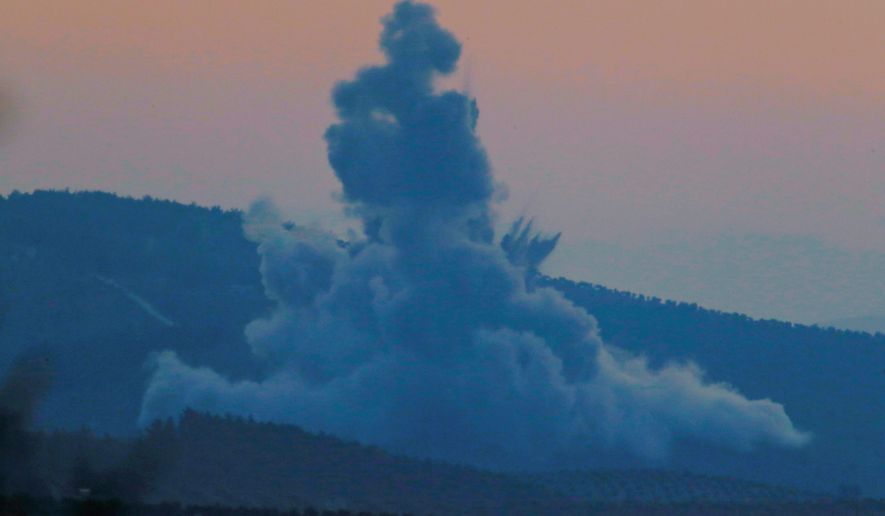The U.S. and Turkey moved closer to an open rift Sunday, with the Trump administration expressing deep concern as Turkish ground forces crossed into northern Syria in a bid to rid the area of U.S.-backed Kurdish militias.
Ankara sees the Kurdish force as an ally to a violent Turkish Kurdish separatist movement it has been battling for decades. Washington sees the Syrian Kurds as critical allies in the fight against Islamic State and a longer-term asset against Syrian President Bashar Assad in any settlement of the country’s brutal civil war.
“We urge Turkey to exercise restraint and ensure that its military operations remain limited in scope and duration and scrupulous to avoid civilian casualties,” said State Department spokeswoman Heather Nauert in a statement Sunday.
Her comments came in response to the Turkish offensive on the enclave of Afrin that began Saturday amid the increasing frustration in Turkey — a major NATO ally — over the administration’s recently announced plan to beef up U.S. support for a Kurd-majority security force in area.
Ankara fears increased U.S.-backing for the group will bolster the ability of Syrian Kurds to traverse the border to support their fellow Kurds inside Turkey. Turkish Prime Minister Binali Yildirim said Sunday that the goal of the offensive is to secure a 19-mile “safe zone” free of Kurdish fighters running inside Syrian territory.
The Turkish offensive has set nerves on edge across the region. The Syrian government, Iran and Egypt have all condemned the attack on Afrin, which activists say left at least 18 civilians dead over the weekend. Saying it is a violation of Syria’s sovereignty, Mr. Assad’s military has threatened to shoot down Turkish fighter jets if they conduct cross-border bombing raids.
Syrian Kurdish operatives, known as the YPG, claimed they were repelling the Turkish advance Sunday, while Turkish officials said a barrage of rockets were fired from Syria northward into Turkey, killing at least one person and injuring several dozen.
There are believed to be as many as 10,000 Kurdish fighters in the Afrin district. But the Turkish advance has exposed violent rifts between various militias operating in the area.
Turkish news organizations claimed pro-Turkey elements of the so-called “Free Syrian Army” — a group that has long battled Syrian government forces — were participating in the advance on Afrin. The Associated Press reported that Turkey had rallied nearly 10,000 Syrian opposition fighters for the operation.
At a minimum, the situation threatens another humanitarian disaster in the region, which houses some 800,000 refugees and internally displaced people from earlier years of war.
France has called for an emergency U.N. Security Council meeting to discuss the developments and urged Turkey “to act with restraint in a context where the humanitarian situation is deteriorating in several regions of Syria.”
There was uncertainty Sunday over Russia’s posture. Heading into the weekend, Turkish Foreign Minister Mevlut Cavusoglu had claimed Ankara was working with Russia and Iran on its plans to attack Afrin.
It was not immediately clear when the U.N. Security Council will convene, but the BBC reported that Frants Klintsevich, a senior member of Russia’s legislature and ally of Russian President Vladimir Putin, said Moscow plans to use the emergency meeting to demand Turkey halt its advance.
There was speculation advance may have been avoided if the Trump administration had issued a more forceful statement of its position last week.
But the administration struggled with its messaging in the messy struggle, insisting it’s not creating a permanent Kurdish enclave in Syria, but also vowing the U.S. will stay involved indefinitely by training a Kurd-majority ground force inside Syria to prevent an Islamic State resurgence.
Secretary of State Rex W. Tillerson and other administration officials scrambled to deny reports that Washington was planning a 30,000-strong “border security force” led by Syrian Kurds in the region after Turkey had expressed outrage at the reports.
Some regional analysts say the administration is not being entirely genuine in its talking points on Syria. Joshua Landis, a Middle East analyst at the University of Oklahoma, told The Washington Times he believes the administration’s policy is to “use this Kurd-majority defense force that the U.S. military is backing and training as a security shield to prevent Iran and Russia from taking over key oil and gas assets in northern Syria.”
— This article was based in part on wire service reports.
• Guy Taylor can be reached at gtaylor@washingtontimes.com.




Please read our comment policy before commenting.